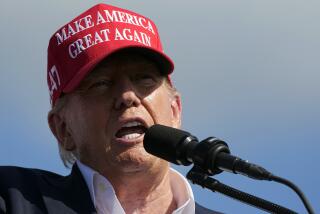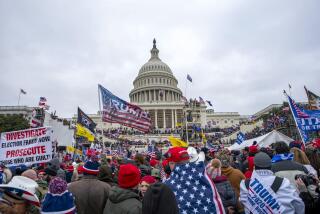THE IRAN-CONTRA HEARINGS : Walsh Asks Panels to Deny North Immunity
WASHINGTON — Independent counsel Lawrence E. Walsh on Wednesday asked the House and Senate committees investigating the Iran- contra affair to refuse to grant limited immunity to former White House aide Oliver L. North, saying such protection could impede his efforts to pursue criminal charges in the case.
Walsh asked that at the least any immunity action be deferred as long as possible. But he conceded after a closed session with the committees that its members are eager for testimony from the central figure in the scandal and said: “I don’t know how it will come out.”
The chairman of the Senate committee, Daniel K. Inouye (D-Hawaii), said that “as far as I’m concerned Mr. North must appear before the committees and testify.” He said the issue will be resolved within 48 hours.
Sen. Warren B. Rudman (R-N.H.), who has criticized Walsh for what he regards as the slow pace of the criminal investigation, said: “I would find it inconceivable . . . that these hearings could ever be complete without the testimony of Col. North.”
Constitutional Challenge
At the same time, attorneys for North on Wednesday argued his constitutional challenge of the independent counsel law before a federal appeals court.
North’s attorneys charged in the court hearing that the statute under which Walsh was appointed abrogates the executive branch’s exclusive authority to conduct criminal prosecutions. But two of the three judges on the appeals panel noted during the session that similar independent investigations have been upheld by the Supreme Court.
Court aides said a decision on the challenge, which is being handled under an expedited procedure, is expected in about a week.
Walsh’s plea to the investigating committees came as the panels are focusing increasingly on what President Reagan and other top White House officials knew of the support being provided to the Nicaraguan rebels at a time when Congress had banned U.S. military aid to their cause.
The investigators believe that testimony from North, who allegedly helped to funnel money and supplies to the contras while he was a National Security Council official, is crucial to resolving such fundamental questions. North has cited his Fifth Amendment right against self-incrimination in refusing to testify.
Walsh said that giving North limited immunity could jeopardize a criminal case because it would bar him from using North’s testimony in a possible prosecution of him.
Walsh got a “cool reception” from the committees, said one member, Rep. William S. Broomfield (R-Mich.), who called the request “absolutely unreasonable.”
“We’ve been extremely reasonable to give him all this time” to build his case independently, Broomfield said.
Rep. Michael DeWine (R-Ohio) said: “Every witness that we hear only emphasizes more how important Oliver North is.”
North’s boss, former National Security Adviser John M. Poindexter, already has been granted limited immunity, but his public testimony has been delayed at Walsh’s request to allow for more criminal investigation.
Walsh said he has been filing evidence under seal with the court to prove that he obtained it independently and said “each passing day” helps.
In the hearing Wednesday on the challenge to the constitutionality of Walsh’s probe, a North attorney, Barry Simon, told the U.S. Circuit Court of Appeals for the District of Columbia that the independent counsel’s appointment by a special judicial panel was a “gross violation of the separation of powers” set out in the Constitution.
Under the Constitution, the executive branch has “the exclusive authority” to prosecute federal crimes, and Congress had no right to set up an alternative system in its 1978 independent counsel law, Simon argued. Former White House aide Michael K. Deaver has lodged a similar challenge against the counsel prosecuting him in connection with his lobbying.
But attorney Guy Struve, representing Walsh, said the independent counsel is an example of an “inferior officer,” which the Constitution says may be appointed by Congress or a “court of law.”
More to Read
Get the L.A. Times Politics newsletter
Deeply reported insights into legislation, politics and policy from Sacramento, Washington and beyond. In your inbox three times per week.
You may occasionally receive promotional content from the Los Angeles Times.











